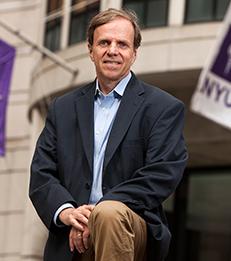Opinion
Why Breaking Up Facebook Doesn't Solve Our Most Pressing Social Media Problem
—


Whether WhatsApp is part of Facebook or a stand-alone company, it needs to address the political manipulation and dissemination of disinformation that is happening through its service.
By Michael Posner
This week, Chris Hughes, a co-founder of Facebook, delivered a dramatic and dire diagnosis of threats his former company poses to our society. Much of his assessment is accurate and troubling. Speaking as an insider, he provides a compelling account of just how powerful Facebook has become and the dangers associated with its dominance. Yet the prescription he proposes—breaking up the company—doesn’t address what is perhaps the most important aspect of the problem—namely, the flood of politically divisive disinformation and harmful content online.
In his 5,500 word essay, Hughes vividly captures Mark Zuckerberg’s driving ambition to dominate Facebook’s rivals and the company’s relentless pursuit of growth, often without adequate attention to the well-being of the larger society. Hughes chides the U.S. government for allowing Facebook to acquire Instagram and WhatsApp and recommends that Facebook be broken up on antitrust grounds.
But let’s assume that the government takes the action Hughes proposes and forces Facebook to divest itself of WhatsApp and Instagram. Then what? Will this stop the Russians from meddling in our 2020 elections and continuing to misuse the internet to further polarize our politics? Will it prevent authoritarian governments elsewhere from deploying the internet to foment ethnic or religious tensions within their own countries? Will it avoid a recurrence of the recent glorification of extremist violence after the Christchurch mosque attacks, with thousands of people posting images of the massacre? And finally, will it prevent governments, both democratic and non-democratic, from imposing content regulations that will balkanize the internet and deny open public debate on politically contentious issues?
Read the full Forbes article.
___
Michael Posner is a Professor of Business and Society and Director of the NYU Stern Center for Business and Human Rights.
In his 5,500 word essay, Hughes vividly captures Mark Zuckerberg’s driving ambition to dominate Facebook’s rivals and the company’s relentless pursuit of growth, often without adequate attention to the well-being of the larger society. Hughes chides the U.S. government for allowing Facebook to acquire Instagram and WhatsApp and recommends that Facebook be broken up on antitrust grounds.
But let’s assume that the government takes the action Hughes proposes and forces Facebook to divest itself of WhatsApp and Instagram. Then what? Will this stop the Russians from meddling in our 2020 elections and continuing to misuse the internet to further polarize our politics? Will it prevent authoritarian governments elsewhere from deploying the internet to foment ethnic or religious tensions within their own countries? Will it avoid a recurrence of the recent glorification of extremist violence after the Christchurch mosque attacks, with thousands of people posting images of the massacre? And finally, will it prevent governments, both democratic and non-democratic, from imposing content regulations that will balkanize the internet and deny open public debate on politically contentious issues?
Read the full Forbes article.
___
Michael Posner is a Professor of Business and Society and Director of the NYU Stern Center for Business and Human Rights.
